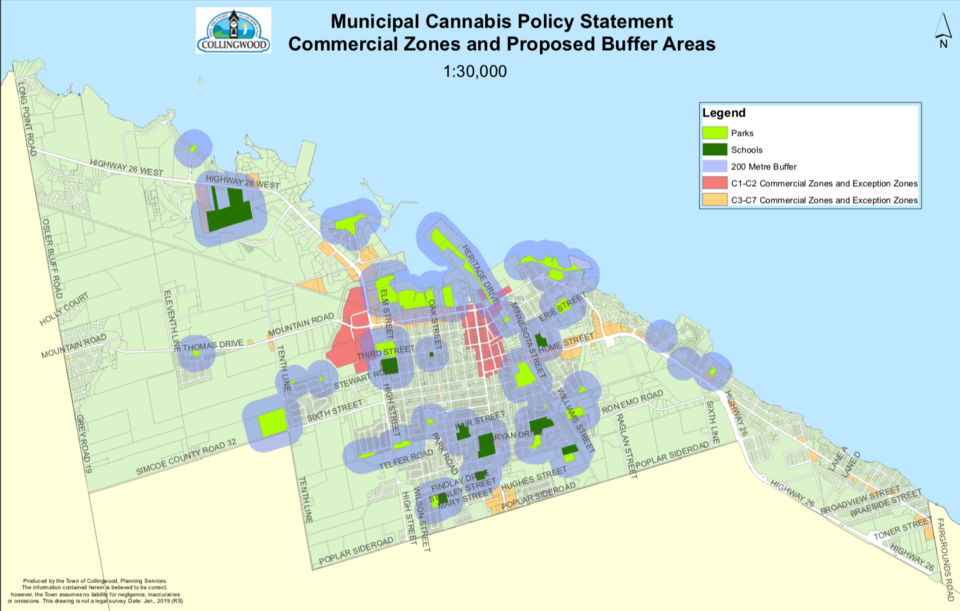Collingwood will be receiving $15,000 from the province of Ontario for enforcement, emergency response, and policy creation surrounding newly legalized marijuana.
This first payment from the Ontario Cannabis Legalization Implementation Fund (OCLIF) should arrive this month, according to a staff report headed to council on Monday night (Jan. 14).
Another payment from the same fund will be paid to Collingwood later this year provided the town opts-in to allow retail cannabis stores within its boundaries. The amount of the second payment won’t be known until March 2019, according to the staff report. Any municipality that opts-out of allowing retail cannabis stores – even if they opt-in at a later date – will not be eligible for this funding.
The staff report refers to a letter from the Minister of Finance stating the province would commit to providing “$40 million in funding over two years to municipalities to help with the implementation costs of recreational cannabis legalization.”
The province is doling out $15 million across Ontario for each OCLIF payment. The first instalment was calculated using 2018 MPAC household numbers, a 50/50 split of household numbers between lower and upper-tier municipalities (like Simcoe County).
The first payment of $15,045 was calculated based on 11,800 households in Collingwood at a rate of $127.50 per 100 households. Simcoe County is receiving $183,972 in the first round of payments.
The money is to be used for increased enforcement, response to public inquiries, increased paramedic and fire services, and bylaw and policy development related to the legalization of marijuana.
There is a remaining $10 million set aside by the Ontario government for unforeseen costs related to the legalization of recreational cannabis. According to the staff report, priority for this funding is also given to municipalities that haven’t opted-out of allowing retail stores.
There is the potential for more funding for municipalities from the province’s share in the federal excise duty on recreational cannabis. The staff report states if duty profits exceed $100 million, the province will provide 50 per cent of the surplus “only to municipalities that have not opted out as of Jan. 22."
Collingwood councillors are set to make their opt-in-or-out decision on Monday night at the council meeting (Jan. 14).
Staff is recommending council opt-in and allow cannabis retail stores in Collingwood, which is what a majority of the public who participated in online, in-person, and written-in consultation have supported.
“Based on the results of the public consultation process to date, it is clear that the majority of respondents are in favour of permitting recreational cannabis retail stores in the municipality,” states the staff report, prepared by the planning and clerk’s services departments.
The report also includes a draft policy statement suggesting a 200-metre separation distance between a cannabis retail store and areas such as schools, registered daycares, addiction centres, shelters, and playgrounds and parks (not including trails).
The policy further suggests cannabis retail stores be encouraged to locate in areas close to existing LCBO stores. A map attached to the staff report (you can read it here) indicate the parks, schools and buffer zones as well as commercial zones where a cannabis retail store would be encouraged to locate, should the town opt-in and allow recreational marijuana storefronts in Collingwood. The existing commercial areas include the downtown core, High Street between First and Second Street, Hume Street near the Pretty River Parkway intersection, High Street near the First Street Intersection, and the intersection of Poplar Sideroad and Hurontario/County Rd. 124.
While recreational cannabis is available for the public to buy online from the Ontario Cannabis Store, it will not be legally available in retail stores in Ontario until April 1, 2019. However, even if council opts-in, it’s unlikely Collingwood will get a recreational cannabis store in the first phase of the storefront program. The province announced a shortage in its recreational cannabis supply, and has limited the number of licenses it grants in the first phase to 25 retail stores in Ontario, and only five in the eastern region, of which Collingwood is a part. The same announcement also stated those licenses would be granted to stores in cities with a population of 55,000 or greater.
The legalization of recreational cannabis so far does not include the sale of cannabis edible products or concentrates. Those are slated to be included in the legalization policy in October this year. Health Canada has launched a public consultation on the draft regulations to govern the sale of these types of products. You can submit feedback online until Feb. 20, here.
Monday’s council meeting starts at 5 p.m. in the town hall council chambers. It will be live streamed by Rogers online here.



